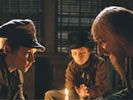Eye For Film >> Movies >> Oliver Twist (2005) Film Review
Ever since Charles Dickens' Oliver Twist: The Parish Boy's Progress first appeared in 1837 in serialised monthly instalments for the magazine Bentley's Miscellany, its larger-than-life characters and many of its phrases, have kept their grip on the popular imagination, even after the 1834 Poor Law Act, whose iniquities the novel was intended to expose, had long since fallen by the wayside. Oliver's journey through the different social strata of Industrial Age England, taking him from Parish workhouse to undertaker's shop and from thieves' den to gentleman's mansion, have previously inspired David Lean's Oliver Twist (1948) and Carol Reed's musical Oliver! (1968). Now, some 40 years later, the young orphan returns to the big screen in a lavish production, directed by Roman Polanski.
For its ambitious scale alone, this new version cannot fail to impress. Large areas of Victorian London have been reconstructed in their entirety by production designer Allan Starski on the back lot of a film studio in Prague and then peopled with a huge cast of paupers, fops, gluttons and rogues whose grotesquery does full justice to Dickens' satirical caricatures of London society. In the foreground, 11-year old Barney Clark holds his own as Oliver, even if, as in the novel, his character is essentially an innocent and largely inert victim, dominated and manipulated by those around him. As though to underline Oliver's passivity, the film opens with a lithograph of a young boy being led along a road by an older man, an image which not only resolves itself at once into nine-year-old Oliver being escorted to the workhouse, but which also recurs on several subsequent occasions as various adults either offer Oliver their "parental" guidance, or else force it upon him, wrenching the poor lad from the path of good to the path of evil and back again.

Overshadowing the orphan are Jamie Forman as the bunglingly bestial robber Bill Sykes, Mark Strong as his decadently dapper accomplice Toby Crackit and Ben Kingsley, almost unrecognisable in ragged beard, proving once again that his performances are never less than perfect, in his mercurial portrayal of the fence Fagin as a many-headed beast - a cruelly stereotyped Shylock, counting his jewels, a piteous human trapped by circumstance, a scissor-wielding monster, a proud father figure, an exploiter of children, a broken man forced to confront a desperate end to a desperate way of life. His mirror image is Oliver's moneyed benefactor Mr Brownlow, played with exactly the right amount of buffoonishness by Edward Hardwicke to prevent him becoming too cloyingly sanctimonious.
In a similar spirit, Ronald Harwood, who previously collaborated with Polanski on The Pianist, has shrewdly excluded from his screenplay much of the overlong and over sentimental detail of Oliver's stay with Brownlow that made the middle section of the novel seem so rudderless and dispensed altogether with Dickens' final revelation of Oliver's gentlemanly origins, thus avoiding any outmoded suggestion that the boy's goodness is really just good breeding.
This is without doubt a children's film, although with Oliver constantly under threat of being eaten by his roommates, beaten by his employers, hanged by the authorities, or murdered by his new "family", there is no denying that this is relatively dark material for the little ones. In fact, Polanski seems at pains to reflect upon the suitability of his story for younger viewers. In one sequence, a terrified Oliver is pursued by a baying crowd, who had just moments before been watching a Punch and Judy show, leaving behind a single boy to remain riveted by the puppetry that is no less violent, if somewhat more mediated, than what is happening in the street around him.
Similarly, towards the end, when Oliver goes to visit a raving Fagin in prison shortly before the old thief is due to be hanged, a guard warns, "It's not a sight for children" - yet what follows is not the bloody spectacle of a public execution, which notably Polanski does not show, but rather the confrontation of unrepentant sinner and forgiving victim, of delinquent father and redeemed son, where evil is a craven madness punished by the very society that produced it and good does not so much triumph as merely, miraculously, endure.
If Dickens' Oliver Twist is now regarded as a classic book, then Polanski has crafted something that already feels like a classic film, beautiful to look at, combining accurate period detail with a certain gothic expressionism and brimming with earthy characters and high drama. So classic, in fact, that it left me wondering where in this extravagant feast of sights and sounds one might find even a trace of the old Polanski, one-time king of the uncanny. Coming from any other director, the film would be hailed as a masterwork, but from the director of such unnerving treats as Repulsion (1965), Cul-de-Sac (1966), Rosemary's Baby (1968) and The Tenant (1975), it seems somewhat tainted by its own rather old-fashioned conventionality. This, however, is unlikely to draw objections from the young males, at whom it is principally aimed, who will probably be left, like Oliver himself, asking for more.
Reviewed on: 06 Oct 2005






















